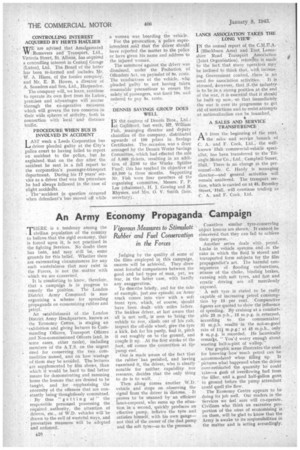An Army Economy Propaganda Campaign
Page 22

If you've noticed an error in this article please click here to report it so we can fix it.
Vigorous Measures to Stimulate Rubber' and Fuel Conservation in the Forces
THERE is a tendency among the , 1 civilian population of the country to believe that -the rigid economy, that is forced upon it, is not practised in the fighting Services. No doubt there has been, and may still be,. some grounds for this belief. 'Whether there are extenuating circumstances for any such wastefulness that may exist in the Forces, is not the .matter with which we are concerned, It is comforting to know, therefore,. That a .campaign is in progress to remedy the position; The London District Army Command is now organizing a scheme for spreading propaganda on economizing rubber and petrol.
An 'establishment of the London District Artily Headquarters, known as the Economy Centre, is staging an exhibition and giving lectures to Commanding Officers, Transport Officers and Non-commissioned Officers (and, in some eases, other ranks), including members of the A.T.S. on the urgent need for conserving the two coramodities• named, and on how wastage of them may be avoided. The lectures are supplemented by film shows, than which it would be hard to find better means for demonstrating and ramming home the lessons that are desired to be taught, and for emphasizing the enormity ofthe offences that are constantly beingthoughtlessly committed.
By thus "getting at" the responsible personnel possessing the required . authority, the attention of drivers, etc., of W.D. vehicles will be drawn to the evil of wasteful Ways, and preventive measures will be adopted and enforced.
Judging by the quality of some of the films employed in this campaign, success Will be achieved. They draw most forceful comparisons between the good and bad types of man, yet, we fear, in the latter case,. with hardly any exaggeration: To describe briefly, and for the sake of example, just one episode; an -Army truck comes into view with a soft front tyre, which, of course, should have been dealtwith miles before. The feckless' driver, at last aware that all is not well,. if seen to bring' the vehicle to rest, climb out of 'his cab, inspect the off-side wheel, give the tyre a kick, fish for his punip, find it, pitch it out roughly on to the ground, and couple it up. At the first stroke of the foot, off conies the couneetion at ttie 'pump end,
One is made aware of the fact that the rubber has perished, and having examined it, the driver, who is clearly notable for neither capability nor resource, decides that the only thing to do is to wait.
Then aleng comes another W.D. vehicle and stops on observing the signal from the driver in 'distress._ It proves to be nranned by an efficient lance-corporal, who sums up the situation in a second, quickly produces an effective pump, inflates the tyre and satisfies himself, with his own gauge— not that of the owner of the dud pump and the soft tyre—as to the pressure.
Countless similar tyre-conserving object lessons are shown. It cannot be Cianceihred that they can fail to achieve their purpose. '
Another series deals . with . petrol. Leaks in vehicle systems. and "in the cans in which the fluid is stored and transported form subjects for the film propagandist's art. The harmful eonsequences of flooding carburetters, misuse of the choke, binding brakes, running with soft tyres, and fast and erratic driving are all mercilessly exposed.
A soft tyre is stated to be easily capable of increasing petrol consumption by 15 per cent. Comparative figures are quoted to show the influence of speeding. By cruising at a Comfortable 25 m.p.h., 12 m.p.g. is returned, according to the commentator; 31 m.p.h. results -in the not-so-good rate of ll m.p.g.: at 45 m.p.h., only 9 m.p.g. is recorded. He laconically remarks. " You'd worry enough about wasting half-a-pint of wallop."
One graphic scene illustrates the need for knowing how much petrol can be accommodatedwhen filling up. It pictures what happened when the driVer over-estimated the quantity he could take—a gush of Overflowing fuel from the filler, arid a.. good half-gallon gone. to ground before the pump attendant could quell the flow.
The Economy Centre appears to be doing its job well. Our readers in the Services we feel sure will co-operate. Civilians who think an excessive proportion of the onus of economizing is, on there, will be glad to know that the Army is awake to its responsibilities in the matter and is acting accordingly.




















































